Mayo Report for 2019-08

|
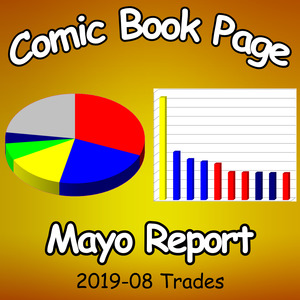
|
Top Comics List Top Comics Breakdown Top Trades List Top Trades Breakdown
August 2019 had 6,468,267 units in the top 300 comics list, a decrease of 487,346 units from last month. The month was a little below the running average of 6,613,769 units for the top 300 comics list. Most of the drop in sales came from DC and Image.
Marvel had seven of the top ten items with Absolute Carnage #1 sold 233,173 units for August 2019 and the second issue sold 94,070 units, a drop of 59,66%. The second best selling comic in August was Marvel Comics #1000 with 206,931 units at an $9.99 price point. House of X and Powers of X_ sold an average of 104,718 units across the two issues release of the two titles. Over at DC, Batman/Superman #1 sold 159,610 units while Batman #77 sold 81,215 units. Batman #76 had the regular version priced at $3.99 which sold 58,539 units at rank 20 and variant priced at $4.99 which was reported at rank 79 with another 26,340 units for a total of 84,879 units for the issue.
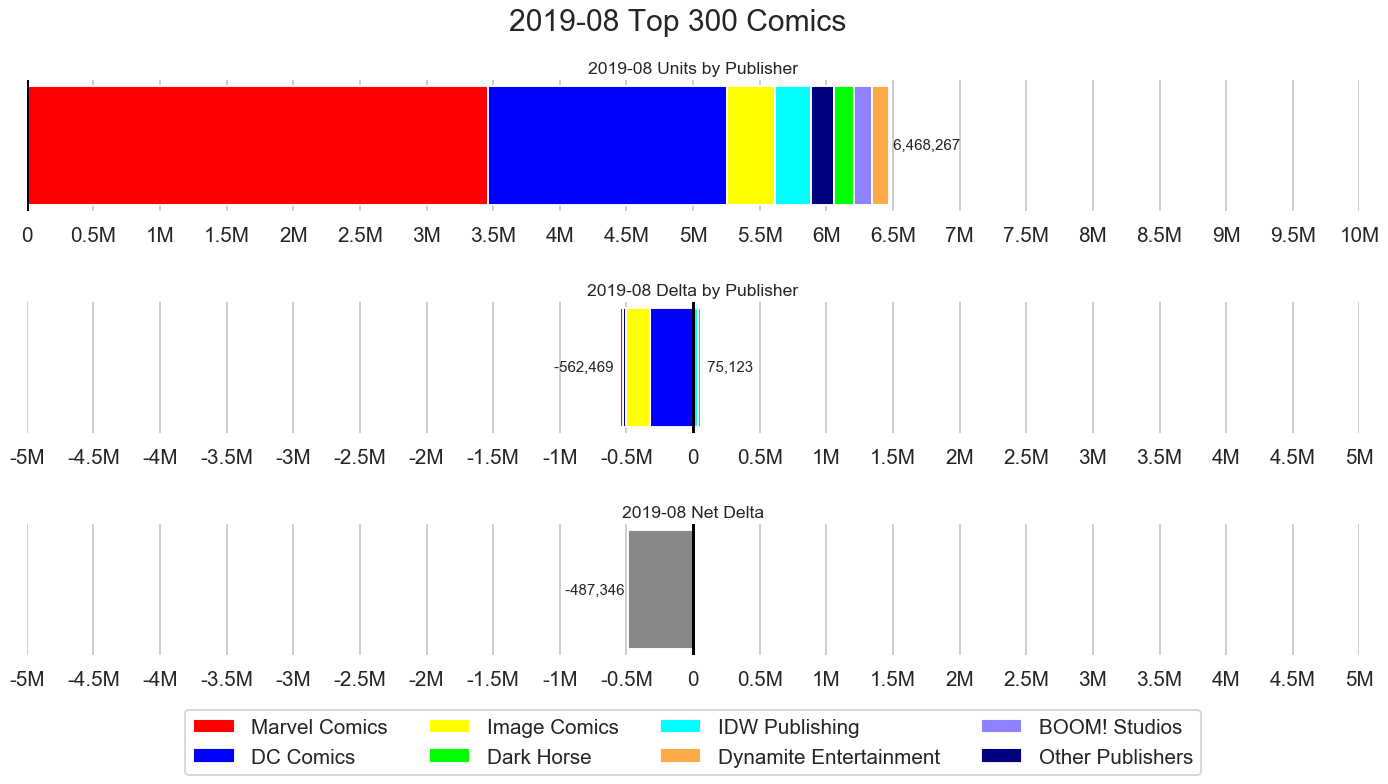
Marvel Comics placed 3,461,737 units in the top 300 comics, a decrease of 24,919 units and accounted for 53.52% of the total units. DC Comics placed 1,794,438 units in the top 300 comics, a decrease of 320,854 units and accounted for 27.74% of the total units. Image Comics placed 359,306 units in the top 300 comics, a decrease of 179,548 units and accounted for 5.55% of the total units. The unannounced ending of The Walking Dead combined with the uptick in sales for the sudden ending of the series accounts for a large percentage of the drop in sales for Image this month. The premiere publishers accounted for 97.32% of the total units for the top 300 comics this month while all of the other publishers with items in the top 300 accounted for 2.68% of the total units for the top 300 comics.
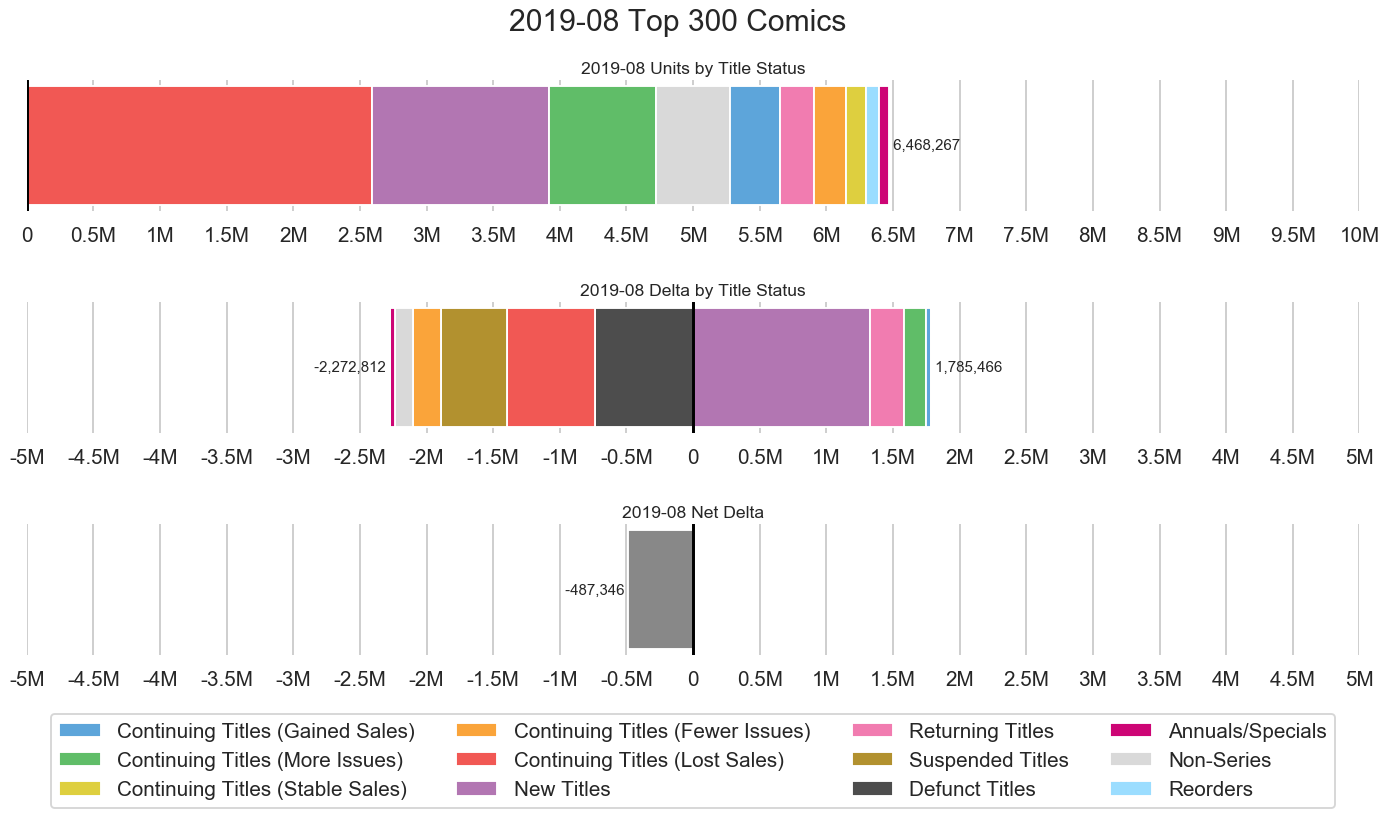
The up-swing of 1,785,466 units from new and increased sales was not enough to compensate for the down-swing of 2,272,812 units from lost sales for the net decrease of 487,346 units.
New titles had the largest impact on sales this month but was overshadowed by the defunct titles, lost sales on continuing titles and suspended titles.
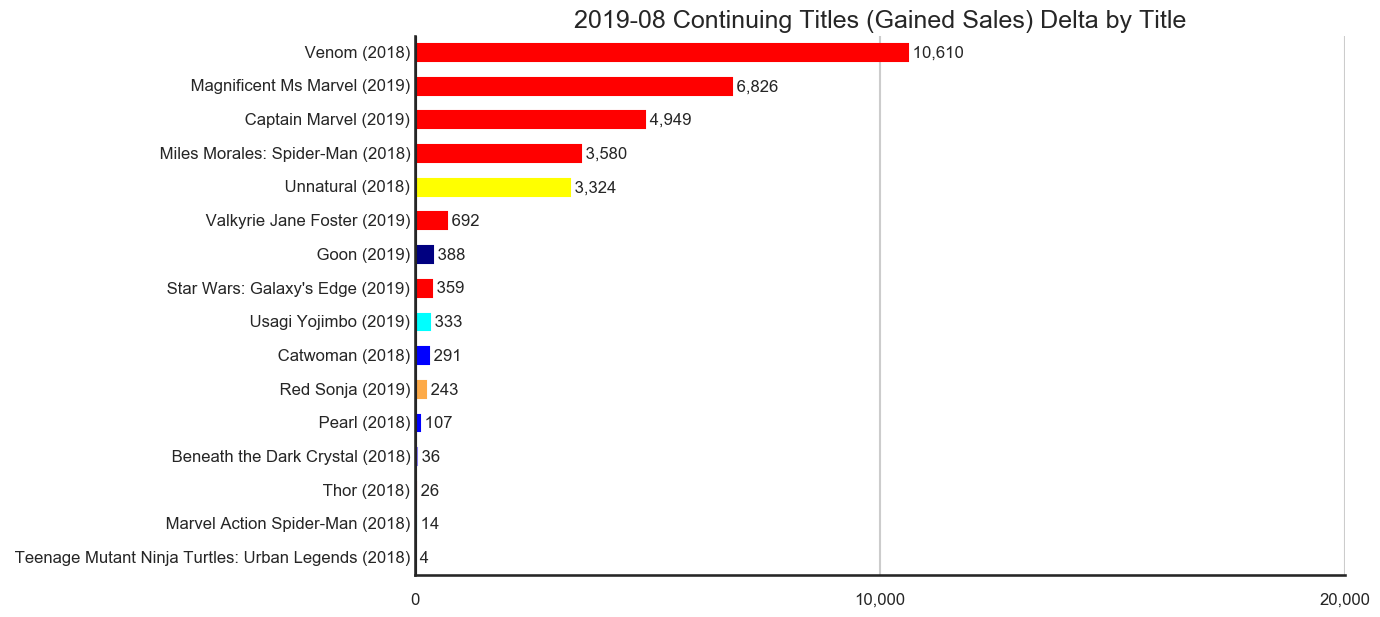
The 16 titles across the 7 publishers in the continuing titles which gained sales category accounted for 375,830 units in the top 300 comics with an upswing of 31,782 units.
Marvel Comics accounted for 85.09% of the change in this category and Venom had the largest gain for a title in August with an increase of 10,610 units and accounted for 33.38% of the change in this category.
The increase of 692 units for Valkyrie Jane Foster is a bit of an unusual case. The first issue had a regular cover, an open-to-order cover, a 1-in-25 cover, a 1-in-50 cover and a 1-in-100 cover while the second issue had just a regular cover and a 1-in-25 cover. Typically this is what results in a typical Marvel second issues drop which sometimes can drop the sales of the second issue to less than half the sales of the first issue. In this case, Valkyrie Jane Foster #2 sold 43,640 units which is more than the 42,948 units the first issue sold last month. The reason my data shows the issue dropped 2,082 units is because the gain/loss is calculated from the total know sales of the previous issue including reorders from the current month. Valkyrie Jane Foster #1 has reorder activity of 2,774 units for the first issue at rank 328 this month which put the total known sales for the first issue at 45,722 units. The increase in first month sales for the second issue and the reorder activity on the first issue are both indicators of unusually solid sales for this title.
While the 4 unit increase for Teenage Mutant Ninja Turtles: Urban Legends might not seem like much of a gain, and it small enough it could be considered part of the "noise" of the data and not the "signal", it is a gain in sales. So few titles actually increase in sales from month to month that even a gain of a handful on units is worth noting.
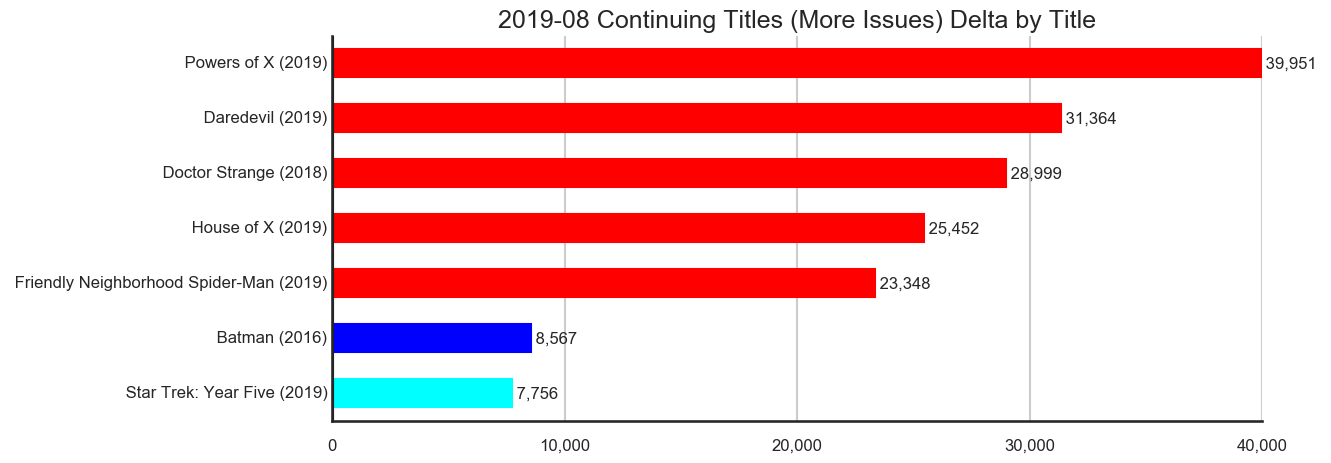
The 7 titles across the 3 publishers in the continuing titles which shipped more issues category accounted for 798,648 units in the top 300 comics with an upswing of 165,437 units. There were five shipping weeks in July and four in August.
Marvel Comics accounted for 90.13% of the change in this category with House of X and Powers of X accounting for over half the units in this category.
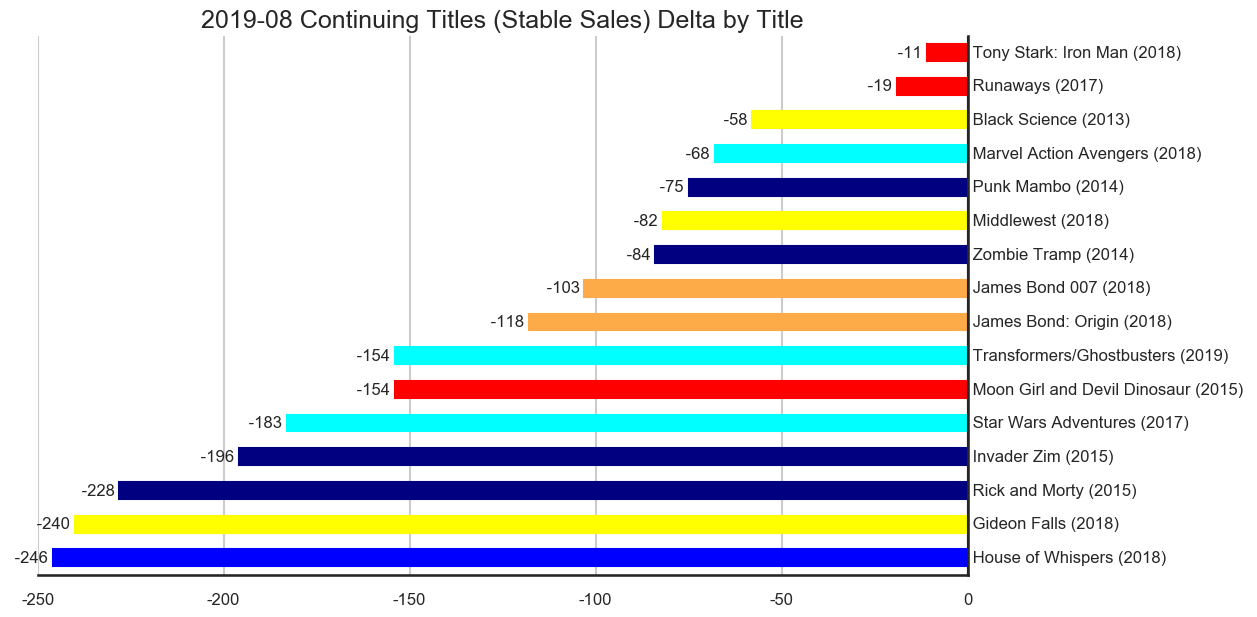
The 16 titles across the 8 publishers in the continuing titles with reasonably stable sales category accounted for 145,242 units in the top 300 comics with a downswing of 2,019 units. The category was split across a number of publishers with no single one dominating the category. This category represents the titles which has only a minor loss in sales for the month.
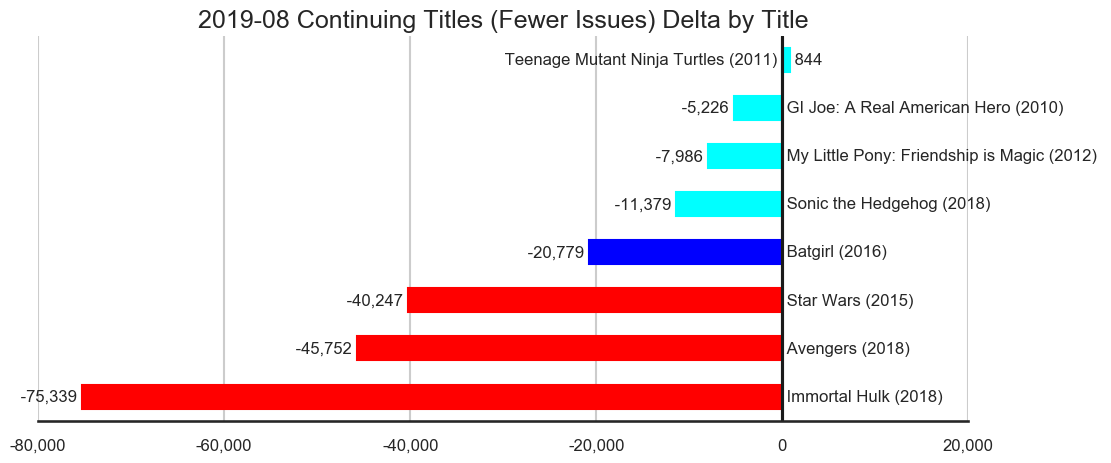
The 8 titles across the 3 publishers in the continuing titles which shipped fewer issues category accounted for 241,197 units in the top 300 comics with an upswing of 844 units, a downswing of 206,708 units for a net a decrease of 205,864 units.
Marvel Comics accounted for 78.37% of the change in this category.
Teenage Mutant Ninja Turtles increased in sales by 844 units overall because of the 32.78% increase in sales on Teenage Mutant Ninja Turtles #97 along with strong reorder activity on the previous two issues. Clearly there is interest in the current storyline which is ramping up to the 100th issue of this run of the title.
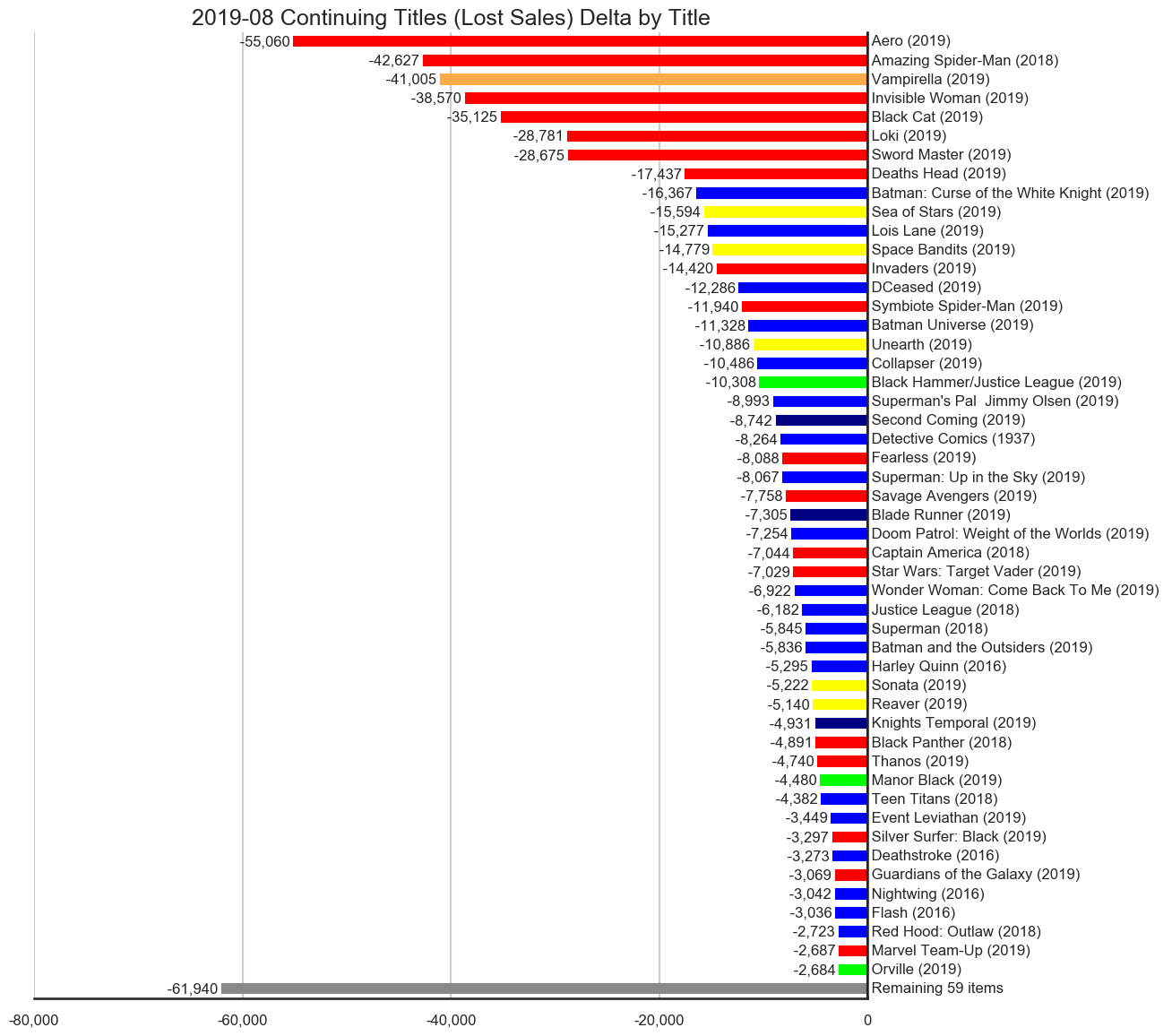
The 109 titles across the 12 publishers in the continuing titles which lost sales category accounted for 2,590,161 units in the top 300 comics with a downswing of 662,561 units.
Marvel Comics accounted for 51.09% of the change in this category while DC Comics accounted for 24.93% of it.
Aero and Sword Master were among those large losses. Both titles feature characters Marvel introduced in the War of the Realms but were originally created for the Chinese market. Both titles has lost over two-thirds of the total known sales of the respective first issues but both title also has reorder activity on those first issues this month.
Invisible Woman saw half the sales disappear on the second issue. The first issue had regular cover, an open-to-order cover, a 1-in-25 cover and a 1-in-100 cover while the second issue only had a regular cover and an open-to-order cover.
Black Cat had a second issue drop of 42.94%. The first issue had regular cover, four open-to-order covers, a 1-in-10 cover, a 1-in-25 cover, a 1-in-50 cover, a 1-in-100 cover and a 1-in-200 cover while the second issue had a regular cover, an open-to-order cover, a 1-in-25 cover, a 1-in-50 cover and a 1-in-100 cover. Fewer covers, lower sales.
These typical large sales drops when the number of incentive covers is reduced from issue to issue is evidence of a speculator market of a meaningful size. If that speculator market were to dry up then sales based on the incentive covers would be significantly reduced which could drastically impact comic sales across the board. Back in the 1990s when there was a speculator boom and bust there were multiple distributors. After the bust, many shop, publishers and distributors had financial problems and a significant number of them when out of business. If a similar speculator bust were to happen in the current market, Diamond could potentially be the focal point being hit both by retailers going out of business and by publishers going under. Hopefully we won't see another speculator bubble burst and if we do, hopefully Diamond has plans in place to make sure they don't get clobbered by it.
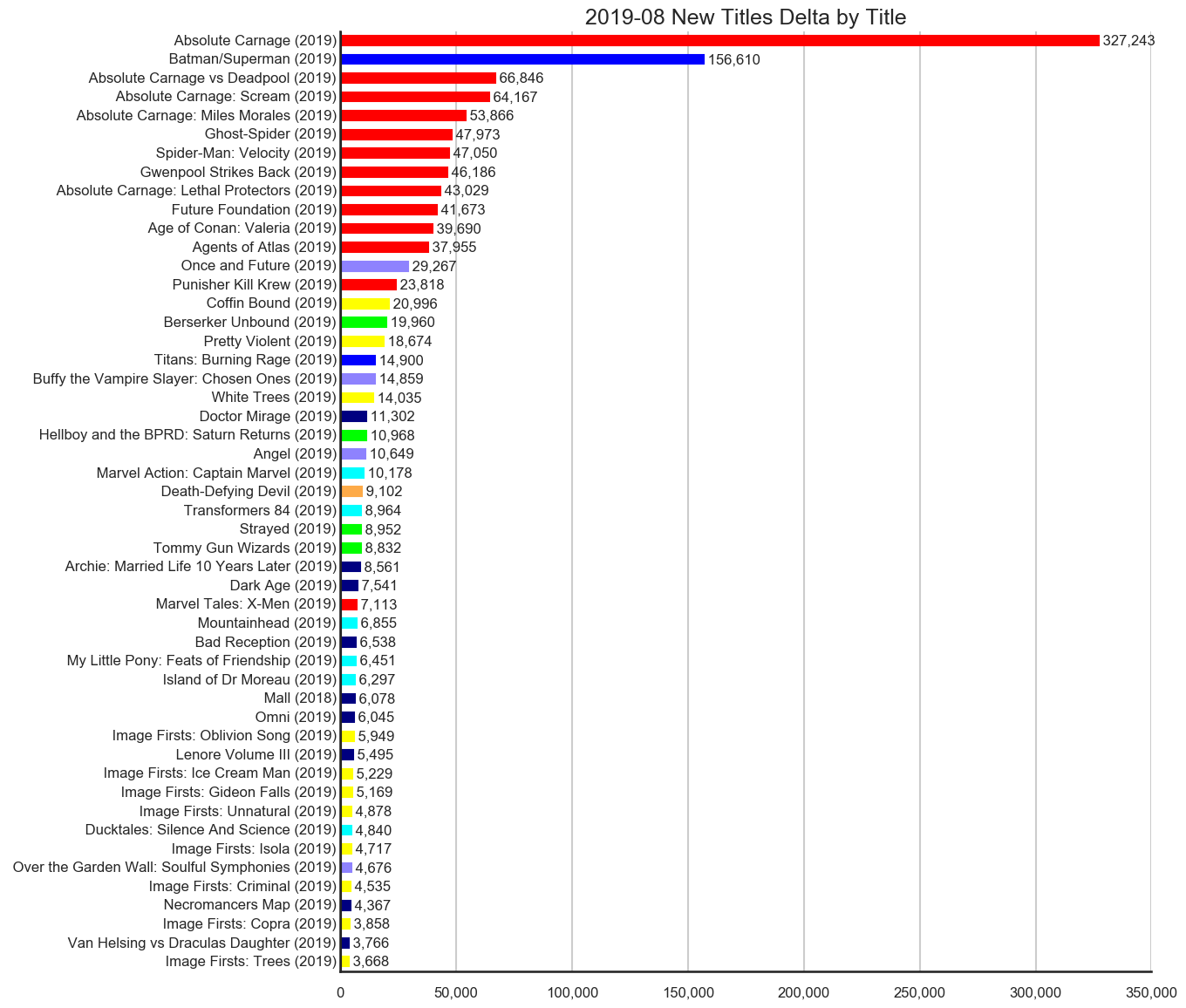
The 50 titles across the 16 publishers in the new titles category accounted for 1,330,370 units in the top 300 comics with an upswing of 1,330,370 units.
Marvel Comics accounted for 63.64% of the change in this category with Absolute Carnage topping the list for this category by a wide margin. Again, Absolute Carnage #1 sold 233,173 units for August 2019 and the second issue sold 94,070 units, a drop of 59.66%. The first issue had a regular cover, six open-to-order covers, two 1-in-25 covers, a 1-in-50 cover, a 1-in-100 cover, a 1-in-500 cover and retailers which did the release party had access to another open-to-order cover and two got copies of another free variant cover while the second issue had a regular cover, four open-to-order covers and two 1-in-25 covers. Take away the 1-in-50 cover, 1-in-100 cover and 1-in-500 cover and the sales dropped. Again, more evidence of a speculator market of a meaningful size.
Absolute Carnage is one of those titles which might be considered an event title. These days it is a little unclear what is and isn't an event title. It used to be much clearer back in the day when there would be only a single event title for a publisher every year or so. These days, no sooner is one event like War of the Realms over when another possible event title like Absolute Carnage starts up. The definition of an event for me is a title or storyline which impacts the overwhelming majority of the title characters and team at the time. War of the Realms fit that definition given both the scope of the story and the number of tie-in issues of the ongoing titles. Even if you skipped the War of the Realms title, if you read more than a dozen of the mainstream Marvel universe titles, odds are one or more of them had tie-in issues to the storyline. While there are a number of side titles for Absolute Carnage, most of then seem focused on other Spider-Man family titles with Absolute Carnage vs Deadpool. Given the Spider-Man/Deadpool sereis from not that long ago, it isn't unreasonable to consider the Deadpool character as being connected to the Spider-Man family of titles.
Batman/Superman launched with 156,610 units and continued the storyline from Batman Who Laughs. The issue kicked off the "Infected" storyline which feels like it might be event level story given the number of character involved in the story and the number of one-shots attached to it. Or the storyline might be limited to this series and the one-shots and not really impact any other title making it feel less like an event storyline. On the one hand, it might not seem like it matter if a title is an event title or not or how you define what an event title is. But an event title which impacts the overwhelming majority of the title characters and team at the time typically has a much larger sales impact than a crossover story which only involves a group of titles instead of the entire line of titles in that narrative universe.
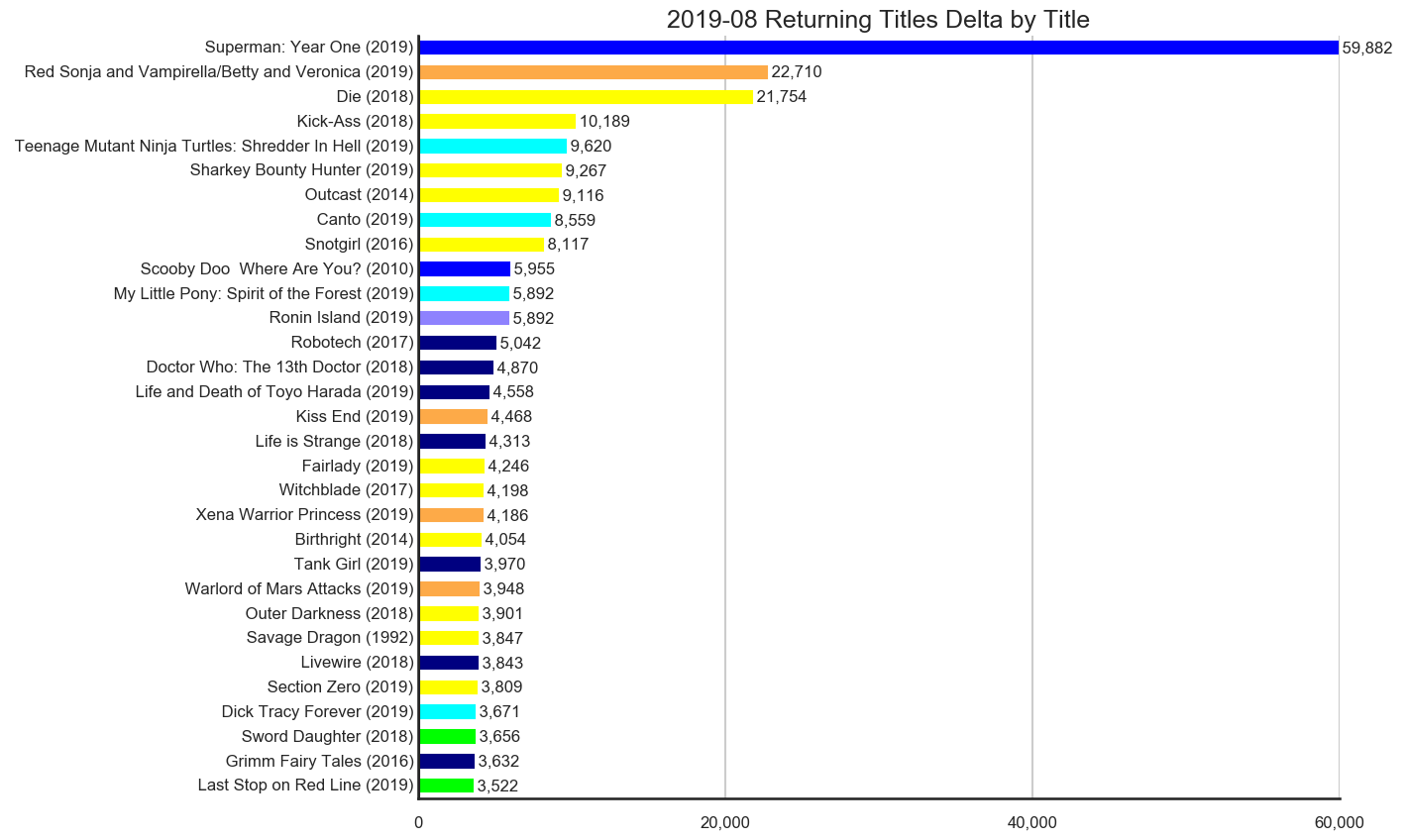
The 31 titles across the 9 publishers in the returning titles category accounted for 254,687 units in the top 300 comics with an upswing of 254,687 units.
Superman: Year One was the most notable of the titles in this category with Red Sonja and Vampirella/Betty and Veronica and Die also having a bigger impact that the other titles in this category.
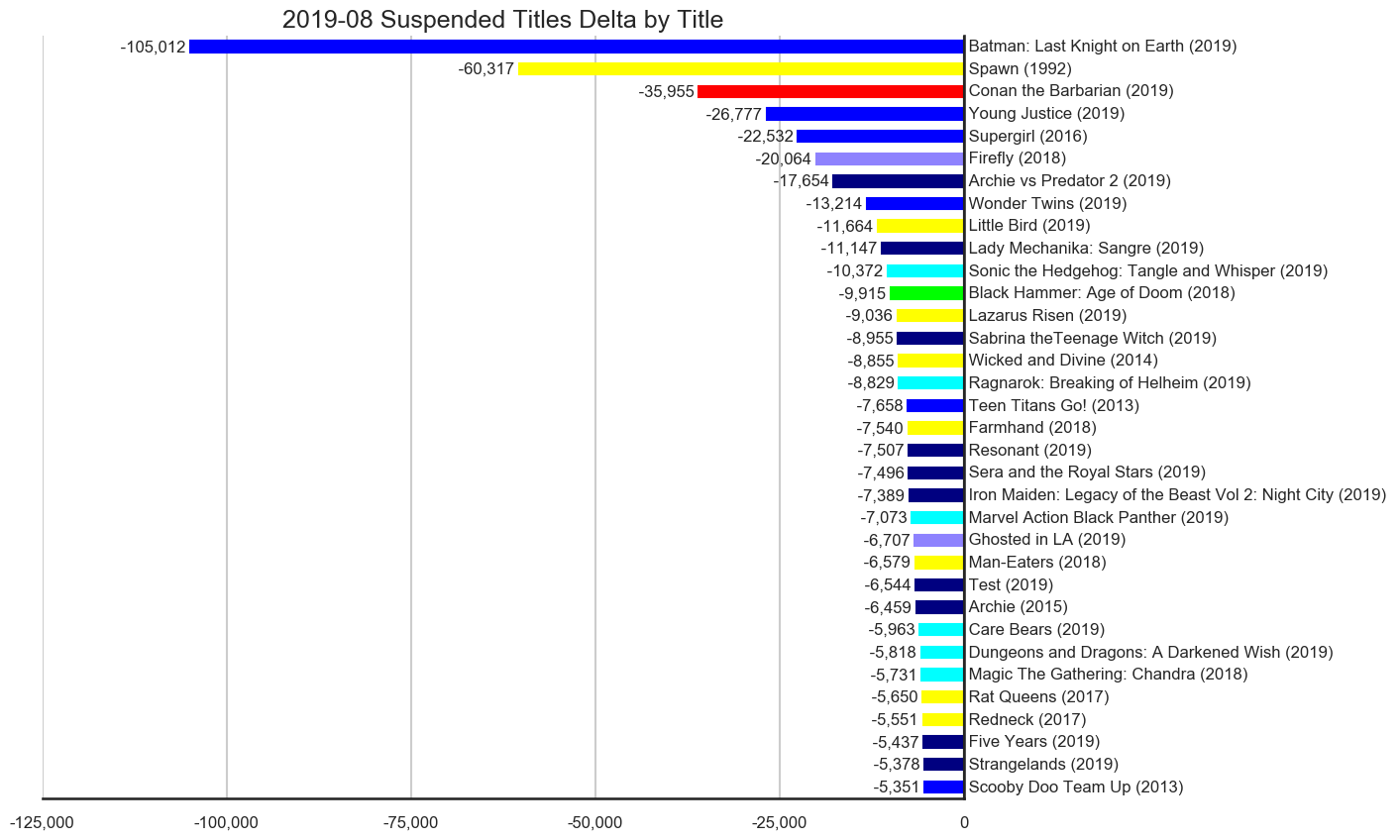
The 34 titles across the 12 publishers in the suspended titles category accounted for a downswing of 496,129 units.
Batman: Last Knight on Earth) accounted for 21.17% of the change in this category and Spawn accounted for another 12.16%.
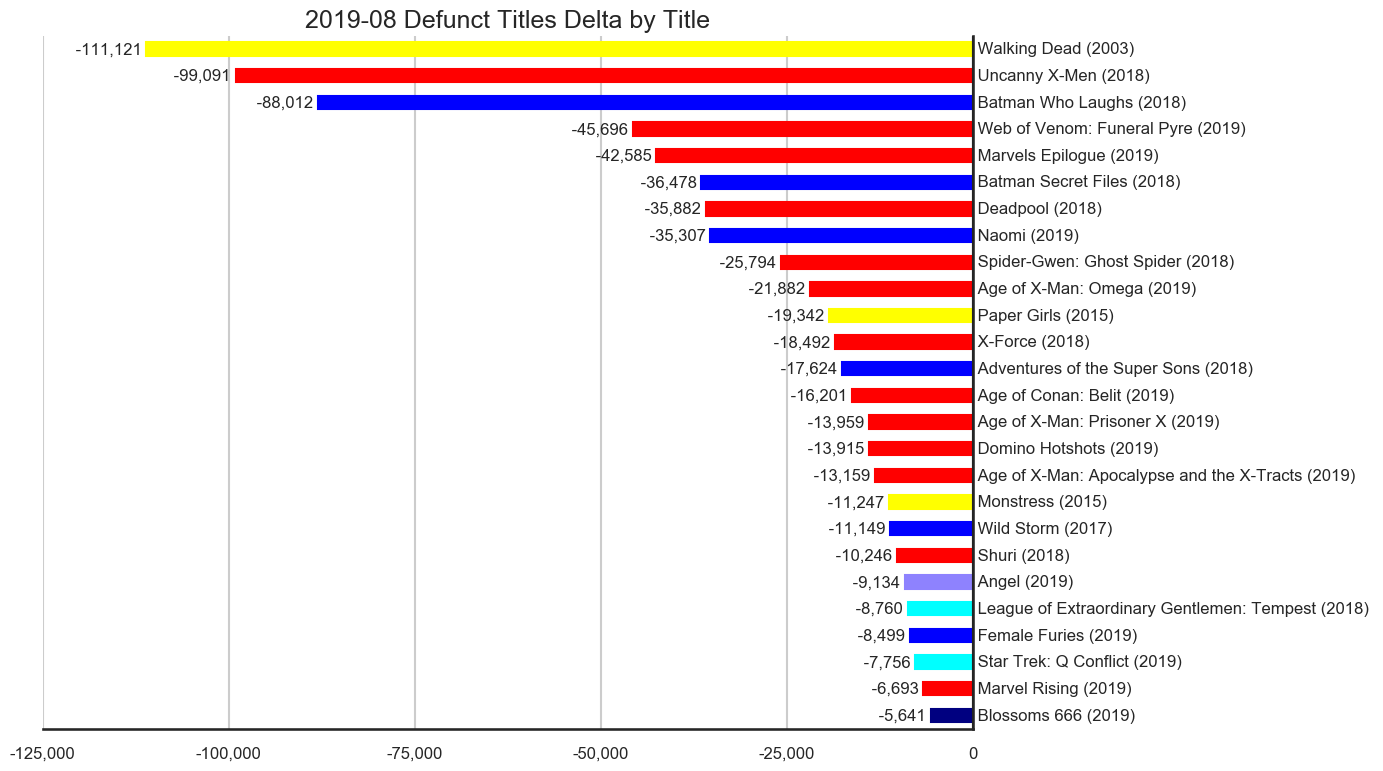
The 26 titles across the 6 publishers in the defunct titles category accounted for a downswing of 733,665 units.
Marvel Comics accounted for 49.56% of the change in this category, DC 26.86% and Image another 19.32%.
The Walking Dead is obviously the biggest title in this category both in terms of impact for the month and in terms of the long term impact. Robert Kirkman solicited additional issues of the series to hide the surprise ending of the title. This title has been a go to example of a true success story in the modern marketplace. The series started at 7,266 units in the direct market, had a low point of 6,067 units on the second issue and ended the run with sales of 111,121 on the unexpected finale. The high sales point was 388,038 units which was one of the handful of times the title had incentive covers. The final trade paperback of The Walking Dead topped the trades list this month with 11,352 units. It has been about 16 years since the title first hit the shelves and we have yet to see another similar sort of success story in the modern marketplace. Robert Kirkman proved it could be done. Now we just need to see it happen again. And, ideally, again and again and again.
Uncanny X-Men ended but was replaced by House of X and Powers of X titles which bridge the gap until the next round of X-Men titles launch. Batman Who Laughs was replaced by Batman/Superman.
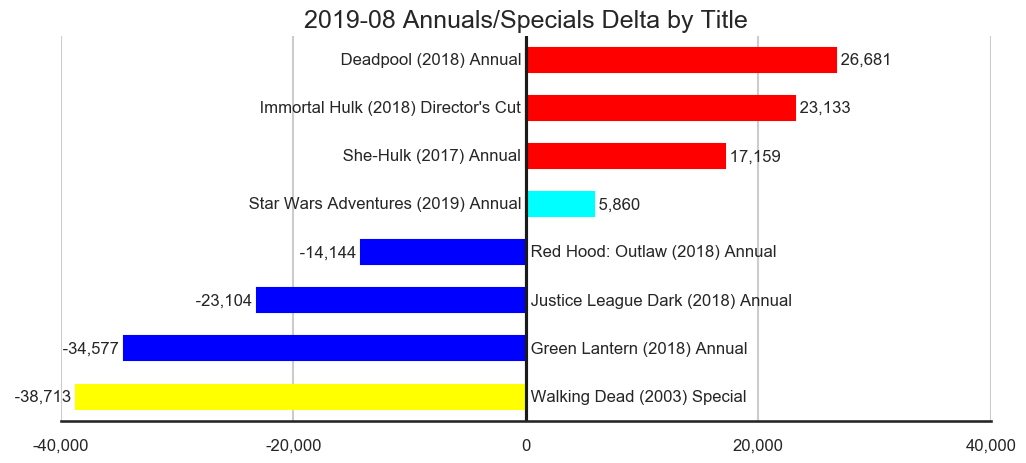
The 8 titles across the 4 publishers in the annuals/specials category accounted for 72,833 units in the top 300 comics with an upswing of 72,833 units, a downswing of 110,538 units for a net a decrease of 37,705 units.
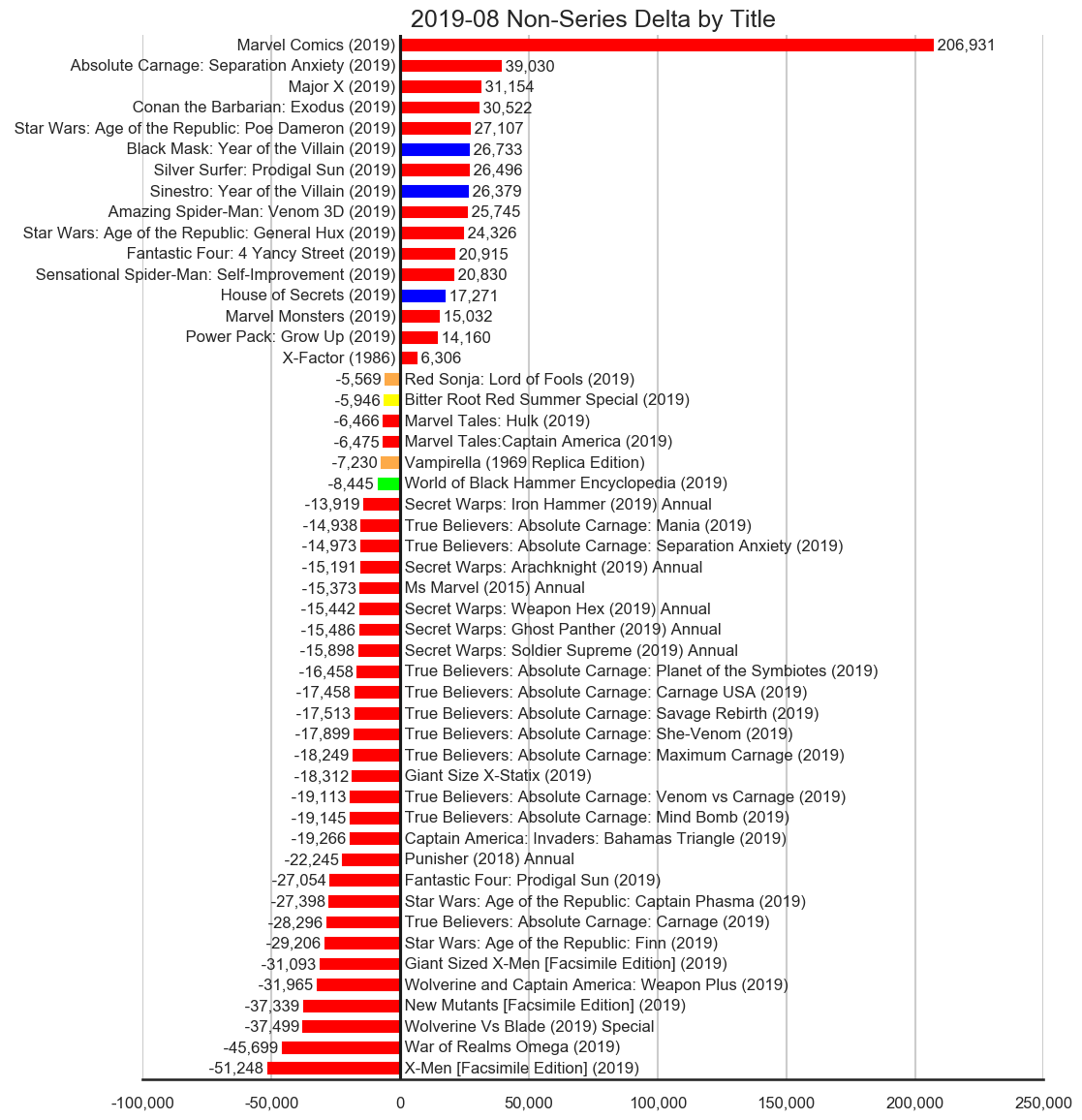
The 50 titles across the 5 publishers in the non-series category accounted for 558,937 units in the top 300 comics with an upswing of 558,937 units, a downswing of 693,806 units for a net a decrease of 134,869 units.
Marvel Comics accounted for 87.41% of the upswing and 96.08% of the downswing in this category. Marvel knows how to do one-shots and other non-series titles. Between things like the True Believers line, the Facsimile Editions, the miniseries disguises as a bunch of one-shots like the Star Wars: Age of the Republic titles and the Secret Warps annuals, Marvel owns this category. DC is starting to explore this area but hasn't found a way to leverage the extensive backlist they have the way Marvel has. Imagine if DC had done a dozen or so Dollar Comics reprinting key Legion of Super-Heroes issues times to the build up of the new title by Brian Michael Bendis. Not only could those comics had sold decently as reprint comics, they could have sparked interest in various Legion of Super-Heroes trade paperback and built up some excitement for the new series. One of many, many missed opportunities by DC in this area.
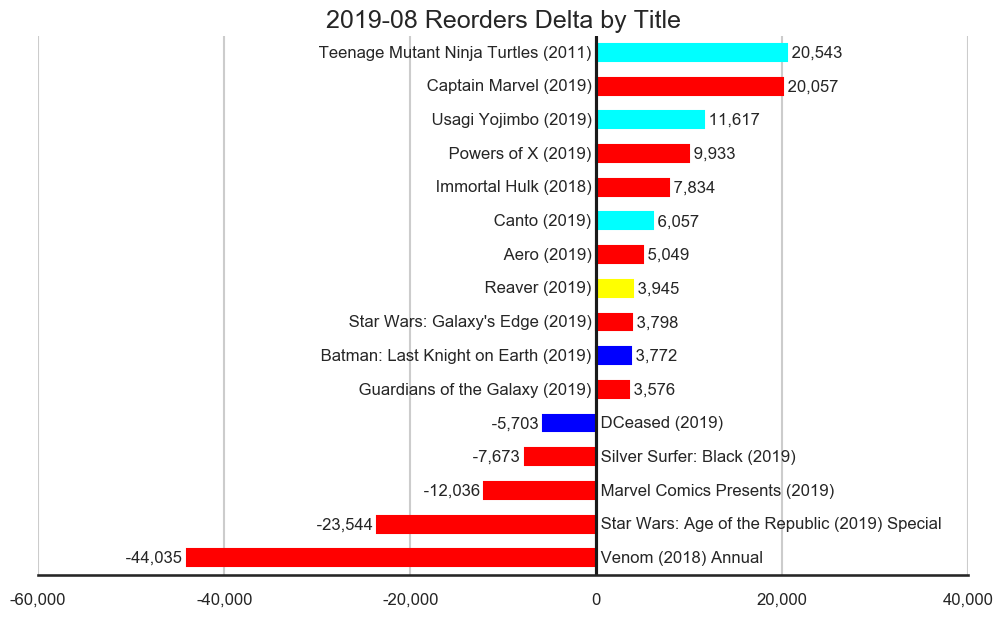
The 16 titles across the 4 publishers in the reorders category accounted for 100,362 units in the top 300 comics with an upswing of 96,181 units, a downswing of 92,991 units for a net an increase of 3,190 units.
As mentioned above, Teenage Mutant Ninja Turtles had some reorder activity for some earlier parts of the "City at War" storyline which is building up to the 100th issue of the title.
Marvel continues to be the top publisher in the direct market. This Even when it doesn't have the majority of the unit sales in the top 300 comics like it did this month, Marvel still publishes more issues and with leverages incentive covers and one-shots to keep sales up for the line. Most Marvel titles last only a year or two before either getting recycled into a new volume or replacement title or actually ending to make room for something else. Some of the tactics Marvel uses such as incentive covers are geared towards short term gains over tactics aimed at getting long term readers. As a result Marvel has high first issue sales followed by large second issue drops and a most titles last only a year or two. The risk is if the short term tactics stop working or if a round of relaunches and new titles doesn't work. Until then, as long as the tactics are working for Marvel, and they clearly are, they will continue to use them.
For a more in-depth discussion of the sales data, check out the Mayo Report episodes of the Comic Book Page podcast at www.ComicBookPage.com. The episode archived cover the past decade of comic book sales on a monthly basis with yearly recap episodes. In addition to those episodes on the sales data, every Monday is a Weekly Comics Spotlight episode featuring a comic by DC, a comic by Marvel and a comic by some other publisher. The podcast covers a wide variety of the comics currently published. If you are looking for more or different comics to read, check out the latest Previews Spotlight episode featuring clips from various comic book fans talking about the comics they love. With thousands of comics in Previews every month, Previews Spotlight episodes are a great way to find out about new comic book titles that may have flown under your comic book radar.
As always, if you have any questions or comments, please feel free to email me at John.Mayo@ComicBookResources.com.

